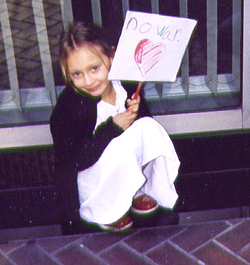Dear Dan, Tom and Peter: Watch Your Language
In much of the US media, pre-war reporting is little more than pro-war reporting
February 7, 2003

 |
| A young peace activist in San Francisco has a message for Washington. Credit: Katherine Schaaf |
When Politically Correct host Bill Maher suggested that it took some courage to fly a pair of jets into the World Trade Center towers, White House spokesflack Ari Fleischer warned Americans that they better "watch what they say."
With the threat of a military holocaust on the horizon (a pre-emptive US assault could kill as many as 500,000 Iraqi men, women and children in less than a week and could "go nuclear") perhaps it is time for US headline writers, news anchors and politicians to "watch their words."
Here is Lesson One from the Great Book of No-Nos: What Washington is promoting is not "War with Iraq." It is an "Attack on Iraq." (Rather, Jennings and Brokaw, please note.)
Lesson Two: Stop using the word "war." To have a war, you need at least two opposing nations threatening to "resolve" a dispute or perceived insult through the application of unrestrained military head-butting.
That's not the situation that obtains between Iraq's Presidential Palace and America's Presidential Palace. Only one of these two nations wants to attack, invade, conquer and install a puppet regime.
True, the US was violently attacked on September 11, but that act did not plunge us into a state of "war." (The Bush administration's rhetoric did, however, plunge us into a state of self-imposed martial law.)
No country has attacked the US. Al Qaeda is not a country, it is a demographic.
Iraq is a country but Iraq has not attacked the US.
If headline writers, pundits and pols want a real scary sentence with the word "war" in it, try this one:
"What if George W. Bush runs a war the way he runs the economy?"
The Media Isn't Mediating
Almost by definition, "pre-war" reporting constitutes pro-war reporting.
It's clear that GWB wants to play with his laser-guided warhorse and is champing at the bit. It is equally clear that the corporate media also is pacing with anticipation. Like the Pentagon, Big Media already has dispatched its troops to the Gulf region.
I recently found myself thinking of the San Francisco Chronicle's legendary columnist Herb Caen. (Herb once dubbed San Francisco "Baghdad by the Bay," a sobriquet that, in more innocent times, suggested nothing more than an exotic and mysterious destination.)
In his last decade of filing witticisms and gossip "three dots at a time," Herb saddled up a personal grammatical hobbyhorse and rode it mercilessly. Irritated by the improper use (or lack of use) of the apostrophe, Herb announced the formation of an ad-hoc "Apostrophe Posse" to report egregious examples of apostrophe abuse.
The Catastrophe Posse
I think Herb would be sympathetic to a modern campaign to deputize a "Catastrophe Posse" whose duty it would be to monitor the media for tense-abuse.
Let me illustrate the problem with a few examples:
On January 24, 2003, the SF Chronicle ran an AP story headlined "Networks Prepare for War." The report by David Bauder quoted former CNN anchor Bernard Shaw's criticism of reporters who allowed themselves to be "taken under the wing" of the Pentagon.
Shaw complained that "journalists that agree to go with combat units effectively become hostages of the military, which can control the movements of the journalists but, more importantly, control their ability, when they file their stories."
Bauder rightly characterized the corporate media's eager fascination with the prospect of war-coverage-inflated viewership when he wrote: "The cable networks already air regular programs in anticipation of a conflict."
But Bauder crossed the line when he typed the following: "Viewers can expect wall-to-wall news coverage on CNN, Fox News Channel and MSNBC when war breaks out" Emphasis added.
It's a Tense Situation
As long as George W. Bush continues to state that he has "not made up his mind" about whether to unleash the hounds of war, the prospect of conflict always should be discussed in the "future conditional" -- may, might, could - never in the future tense - will, shall.
Reporting from Baghdad, ABC News Anchor Peter Jennings would have incurred the wrath of he Catastrophe Posse. In his January 23 commentary, Jennings honored the future conditional throughout most of his report but he allowed his professionalism to slip with his closing comment.
Referring to the arduous eight-hour drive that took his TV crew from Baghdad to Amman, Jordan, Jennings noted that invading Iraq by land would not be an easy task. He then referred to US General Tommy Franks as "the man who will lead that invasion."
As the Bushmacht ratchets up the drumbeat of its war dance, these Freudian slips are appearing with mounting frequency in the media. It's time for the populace to mediate the media.
Keep your ears alert for the sounds of "inevitability." (The word "inevitability" is also part of the problem.)
One way to stand for peace is to not stand for the use of "war language." Not by politicians. Not by pundits. Not by the media.
You Are Hereby Deputized as a Member of the Catastrophe Posse.
For more information contact:







